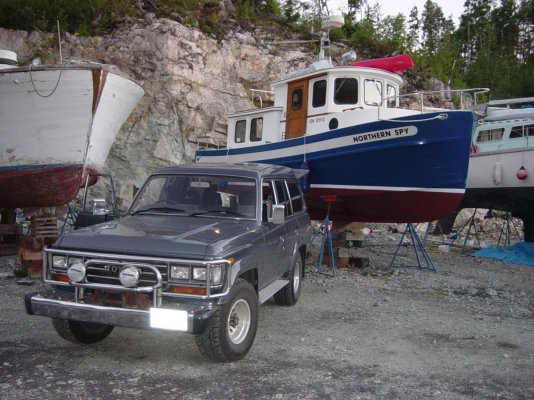Rather than repeat too much I'll add some of my "MVTs" that came in handy over and over again. I'll leave out a lot of the basics already mentioned. Most of this is a cut and paste from a reply I posted in another forum.
Since we lived aboard and cruised full time (old definition of cruising: "fixing your boat in exotic places") I had a bunch on board and never regretted it. And I am not the handiest guy in the world, I had pros do my heavy duty engine work, such as that was. But there is a lot of fairly simple stuff that the boat always needs to have done.
Perhaps my most heavily used tools were a set of Stubby Gear Wrenches, open ended on one end. So many uses, so convenient. I had a big full Craftsman ratchet and hand wrench set and barely used it in 6 years. A small torque wrench was more handy. Oil filter wrenches, both jaw and strap, which come in handy for a variety of things. And a sparkplug wrench if you have a dinghy.
In the same vein, a ratcheting screw driver with a selection of bits. Longish T handle nut and hex drivers (these or the gear wrench, very handy for hose clamps).
One of those long flexible grabbers for when stuff gets dropped into hard to reach places, which is the only place (other than overboard) stuff gets dropped on a boat. As an adjunct a little mirror on a telescope.
Long angled needle nose pliers. Likewise, some "long nose" vise grips. Several sizes of scissors.
A couple of different sized pipe wrenches, including a small one.
A small vise and a hacksaw, a folding Japanese style hand saw, a small set of a variety of files.
Ballpeen and claw hammers, dead blow non-sparking hammer, rubber mallet (especially this), small hand sledge. A big and a small crowbar. Non-ferric metallic and nylon "wire" brushes"
The above covered maybe 90% of my hand, non-electrical tool use. I had all kinds of other stuff for those other 10% rare but irritating events. But I could have gotten away without most of it.
Power tool wise, a small drill driver (the little Bosch's are great, I had a medium sized Panasonic) and a small impact driver. The Hatteras is a big boat with great access, but the smaller sized tools of all stripes were so much more useful than the big stuff I had brought from land living.
On the electrical side, a good ratchet crimper, wire stripper, cutters and heat gun, all essential and mission critical. And a really good AC/DC digital multi-meter with amp clamp, which was maybe the MVP of the whole lot. A battery terminal puller came in handy for a number of things.
Not necessarily tools, but a wide variety of flashlights; my most used in order were a big plastic waterproof floater that takes a lantern battery and has a folding kickstand, a Stanley tripod style, and a head lamp. A slim hanging LED trouble light. An infrared thermometer (very useful for all sorts of things). A couple of different sized tape measures, seemed to be pulling that thing out for one reason or another all the time. A digital micrometer too.
A small wet dry vac (I used a 2.5 gallon, very portable and handy) is essential.
There are a lot of little "nice to haves". Many of those have already been mentioned, my duplicates here are to emphasize the importance. I brought and bought all kinds of stuff when I set out, arguably much more than I needed, yet sooner or later I always found a use, sometimes unexpected, for just about everything. If you have the room, and/or if you are extremely handy, you just can't have too many tools. When you are out there in the middle of nowhere, running down to the hardware store just isn't an option.
I try and go through a mental exercise every once in awhile by asking myself, what if this failed, what if that failed, etc? Can I get the boat to safety? Do I have the right tools to repair the problem? Usually, the answer is yes...it may take some jerry rigging but it would get me to shore. For those jobs that would leave me stranded at sea, a direct line to the USCG helicopter crew would be nice!


